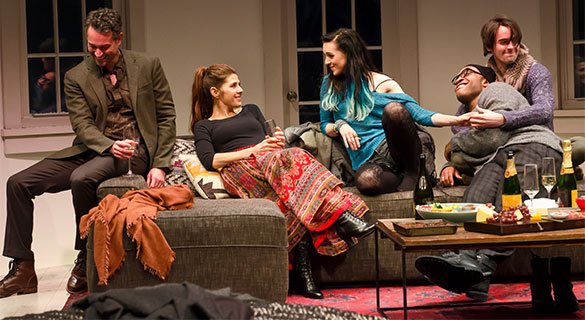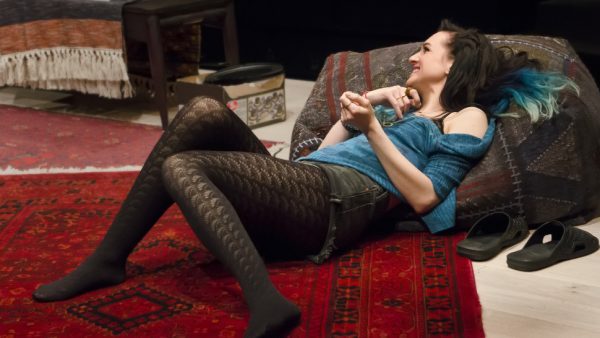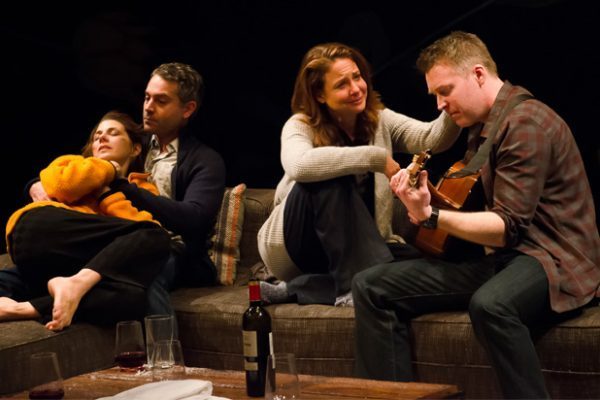
Polyamory is front and center in Sarah Ruhl’s HOW TO TRANSCEND A HAPPY MARRIAGE (photo by Kyle Froman)
Lincoln Center Theater at the Mitzi E. Newhouse
150 West 65th St. between Broadway & Amsterdam Ave.
Tuesday – Saturday through May 7, $87
212-362-7600
www.lct.org
“I think in the polyamory movement, you sort of just — accept — the person’s sexual predilections,” Jane (Robin Weigert) says early on in Sarah Ruhl’s How to Transcend a Happy Marriage. “Is it a movement now?” Paul (Omar Metwally) asks. “I think so. There’s a book — called The Ethical Slut. It tells you how to do it,” Michael (Brian Hutchison) replies (referring to an actual book). Two New Jersey couples learn quite a lesson about the “movement” when a polyamorous triad comes over for New Year’s Eve in this extremely clever play, running at Lincoln Center’s Mitzi E. Newhouse through May 7. Married breeders Jane and Michael and George (Marisa Tomei) and Paul are best friends, but they’re not exactly Bob and Ted and Carol and Alice. When legal aid lawyer Jane tells the others about a polyamorous temp in her office who lives with two men and slaughters her own meat, they all decide that they have to meet. So on New Year’s Eve in a quaint suburban home, the beautiful, free-spirited Pip (Lena Hall), brash mathematician David (Austin Smith), and stoned slacker Freddie (David McElwee) discuss hunting, Pythagoras, music theory, Twelfth Night, “radical honesty,” impenetrable pistachios, harmony, and mermaids over vegan hash brownies that soon have Jane, Michael, George, and Paul so enraptured with the alluring Pip that they’re ready to do just about anything with her and her two lovers — but they’re not prepared for what they have to face the next morning, and potentially the rest of their lives.

Lena Hall stars as a polyamorous ingénue in new Sarah Ruhl play at Lincoln Center (photo by Kyle Froman)
As the audience enters the theater, a skinned animal hangs from the ceiling of David Zinn’s living-room set. A woman, whom we later learn is Pip, walks up to the sacrificial object, takes it down, and carries it offstage, cradling it like it’s a baby. It’s an apt metaphor for what follows, as the conventional world of straight married couples gets butchered, in a way. Paul is an architect relegated to bathroom renovation. George (short for Georgia) became a junior high school teacher instead of getting her PhD in classics. Michael used to be in a rock band but now writes jingles. And Jane regrets losing what she once was. “Life with a teenager is a series of reprimands until your personality disappears,” she says. Believing they’re all stuck in a rut, they are fascinated by the seemingly carefree world that Pip, David (pronounced dah-VEED), and Freddie live in, even if they don’t understand it. “Our language is limited and so our imagination is limited,” David explains, referring to most of humanity. George is particularly ready to break out; she wants to sing “Wild Thing” and compares the New Year’s Eve party to the “wild rumpus” in Maurice Sendak’s Where the Wild Things Are, telling the audience directly, “It was dirty but I felt sort of gloriously clean.” George and Paul and Michael and Jane might have thought they were happy, but Pip represents a spirituality that has evaded them. (Even the brand name of the bow George uses in the forest is Spirit.) Pip is studying to be a body worker, but she gets inside people’s minds as well, with a touch of magic.

Two couples deal with the fall-out from a crazy New Year’s Eve party in HOW TO TRANSCEND A HAPPY MARRIAGE (photo by Kyle Froman)
“Really polyamory takes all the fun out of adultery,” Paul says playfully, but two-time Pulitzer finalist Ruhl (Stage Kiss, In the Next Room or the vibrator play) digs much deeper than that relatively simplistic aside. Ruhl and director Rebecca Taichman (Marie Antoinette, The Oldest Boy), who have previously collaborated on Stage Kiss, The Clean House, Dead Man’s Cell Phone, and Orlando, neither defend nor attack polyamory while dealing with such issues as personal and familial responsibility, shame, and sexuality throughout one’s life. The cast is uniformly strong, but Tony winner Hall (Hedwig and the Angry Inch, Kinky Boots) does the heavy lifting with an infectious lightness; in order for the play to work, the audience must fall in love with her just as all the characters do, and she makes it nearly impossible not to be drawn into her youthful enthusiasm. The second act is much darker than the first and sometimes goes astray, particularly when Pip takes George hunting and things don’t turn out quite as planned, and thank goodness the show doesn’t immediately end after Michael sings one of his songs. Ruhl still has a bit more to say, bringing it all back home with a sweetly meaningful finale.